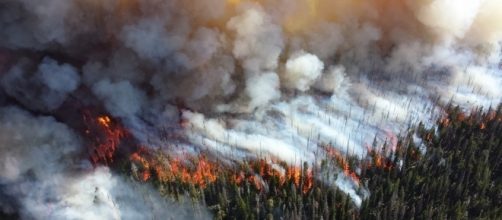It was Friday, July 7, when wildfires erupted across British Columbia, Canada. Though most of the fires were the result of lightning strikes, CBC News has said that some of the blazes were caused by people. After only a couple of days, more than 180 fires have been counted across the province. With no rain in sight, relief from the intensity of the situation is nowhere in sight.
Province in a State of Emergency
The BC Wildfire Service is typically able to contain outbreaks within 24 hours, but this time it has taken three times longer and the fires are not yet under control.
The province is in a state of emergency and on their website’s interactive wildfire map, the province is smothered by fire symbols. Their emergency notifications consist solely of evacuation alerts and orders from the past several days. With enough help, it is hoped that the flames will be contained but time will only tell.
Thousands displaced as fires spread
More than 7500 people have been displaced since Friday, according to CBC News and that number is rising. 12, 000 hectares have been lost to the fire disaster that is sweeping the Western coast.
Help on the way
Fortunately, the British Colombian government has jumped in to help, providing $100 million to be used for resources that will help rebuild the lives and land that have been affected by this tragic event.
Over 300 Canadian firefighters are arriving Monday or Tuesday and Saskatchewan is sending three aircraft as well.
A new method may soon be available that will revolutionize how humanitarian organizations help victims of natural disasters: Disaster Maps. This is an initiative that is currently being tested by International Red Cross and UNICEF that helps locate displaced people when tragedy strikes. Instead of using important resources to look for where people might be located, they instead rely on the use of an app that provide crucial and potentially life-saving information about what is occurring on the ground during a crisis.
International cooperation is key
After the horrors of last year’s Fort MacMurray fires in Alberta and Saskatchewan, this is a painful reminder that we are at the mercy of our environment.
Working together is crucial in times of dire need. When tragedy struck last summer, firefighters from across the world were sent in; without their help, it is difficult to imagine just how different the situation may have become. There is currently very little in the way of international awareness and support for this ongoing crisis.
The province is now accepting donations as they continue to try and contain the fires. As the Internet can be an incredibly powerful tool, Canadian news channels and citizens have been sharing posts to spread awareness and ask for help in this devastating situation. Without the help of rain, firefighters must face this disaster with brave determination.


